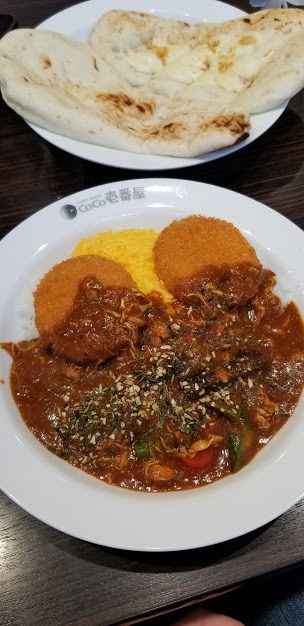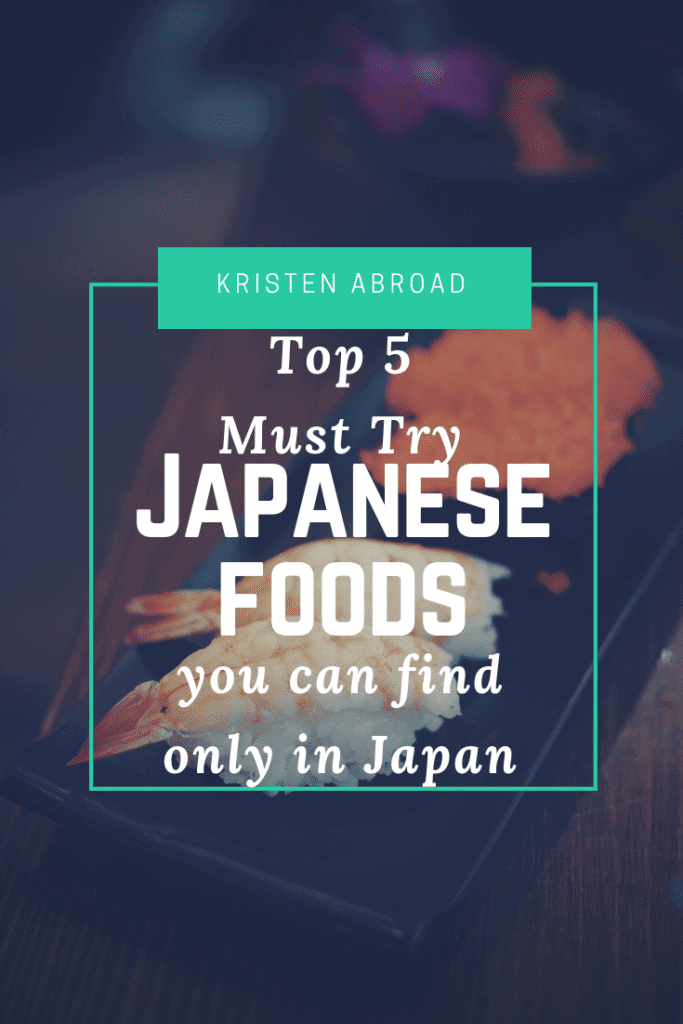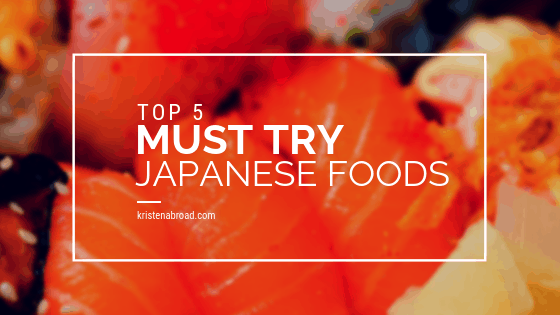Speaking about food is like speaking about the weather. It’s a great icebreaker for tourists and those living here alike. An easy conversation to have when English or Japanese aren’t your forte. From school children of all ages to retirees working on their English skills, I’d give a 99% chance their survey questions will include asking, “what’s your favorite Japanese food?”. Usually, this is followed by some counting on the asker’s fingers, “sushi? Sashimi? Ramen?” and conversation ensues. Want some extra brownie points? Drop an only in Japan food. Don’t have one to drop? Read on for my top 5 must try Japanese foods in Japan.
Common Japanese Food else where
Coming from America, we have Japanese Steak Houses or “hibachi”, which isn’t the same thing as the Japanese word, teppanyaki (鉄板焼き, literally iron board grilling). Sushi places are, of course, popular. Ramen is taking off, though I’ve only had poor representations of the real deal. Besides that, there aren’t really many dishes that have hopped the ocean.
But oh, there are SO many other amazing Japanese foods. Being able to elaborate some of these “obscure” foods will get you mad props with the locals, at least it has for me.
Top 5 Japanese Foods to Try in Japan
Here are 5 of my favorite “only in Japan foods” (and if you’ve seen these in the states or else where in the world, for the love of god, please comment where you can find them!):
1. Okonomiyaki お好み焼き
There’s actually several distinct styles of this savory pancake goodness. “お好み” (okonomi) means “how you like it” and “yaki” (焼き) means to cook. Generally, of the frying variety on a teppanyaki pan or griddle.
Different regions of Japan have different base additive but they all have the commonality of a type of pancake batter. I prefer a cabbage base but you can also find a noodle base. The rest is where the “how you like it” comes to play. Add any variety of ingredients of meat and vegetables you like! Legend has it okonomiyaki started as a way to use up leftover foods.
“Deconstructed okonomiyaki” (my term) is a version in which the pancake remains more of a crepe and the ingredients are wrapped inside. This is a lot of the time what you will find as a festival food.
If you go to a restaurant for okonomiyaki, most shops you will cook yourself and the shop merely gives you all of the ingredients in a very small bowl. The goal is to not beat the batter too much, hence the art it takes to mix the ingredients!
I’ll lump もんじゃ焼き (monjayaki) into this category as well. Tokyo’s soupier version that the goal actually is to nearly burn it. At least that’s how all of my local friends eat it! If you are in Tokyo, head to exit 7 of Tsukishima Station (月島駅) where there is a
2. Omurice オムライス
This Yoshoku (Japanese-style western food, 洋食) is part fried rice, part omelet. The rice tends to be mixed with ketchup, as is the thin fried egg topped with as well. You find this is maid cafes a lot and the girls draw very cutesy characters on top. The ingredients can vary with the rice as can the sauce on top. Sometimes you will see it with a demi-glace.
Very simple and delicious. Though don’t nearly have the talent of this guy making them in the Red Brick Warehouse at Yokohama Tachibanatei.
3. Curry Rice or Japanese Curry カレーライス
Don’t let the name curry confuse you. This is not Indian or Thai curry but a very Japanese creation. Originally introduced by the British Navy, it quickly was adapted to the Japanese taste buds. Now you can find mom and pop shops all over Japan with this delectable Japanese food.

Or you can go to Coco Ichibanya for a semi-fast food chain. Where as local cuisine won’t generally be spicy, Coco’s you can up the spice level to your hearts content.

4. Onigiri
I’ve spoken of onigiri before, and I’ll bring it up again. This yummy little morsel makes a perfect snack or even a meal (if you have a few of them). Especially great for hiking, they travel well and can be found in any コンビニ (konbini, convenience store) or super market.

5. Sukiyaki すき焼き
The raw eggs in this dish may be unpleasing for some but as far as nomikai (飲み会, literally “drinking meeting”) options go, it’s definitely one of my favorite. Yes, you heard me. Raw. Egg. The dish is a
No need to worry about salmonella. The bacteria generally comes from the shells of the eggs and Japan has very stringent requirements on washing the eggs before shipped. I’ve never heard of anyone becoming sick from eating raw eggs in Japan and there are several dishes that utilize them!

Must Try Staples
This post is about getting outside the box but I have to put in a plug for what Japan is known for. You will find no shortage of ramen and sushi restaurants in Japan.
Sushi
You have three options for sushi. One, believe it or not, convenience stores (コンビニ,
Ramen
With so many different types of ramen to try, you could eat it every day of the week and never run out of different shops and different bases.
Originating from China, you can still find different Chinese shops with the staple. They will have a different flavor to their Japanese cousin. The style of shoyu-tonkotsu (醬油豚骨) that originated in Yokohama is a must if you are near Tokyo. And my most absolute favorite,
Other Japanese Foods
Have other Japanese foods you’ve heard of and always wondered about? Leave me a comment and I’ll do a feature on it! And if I haven’t tried it, it will give me a good excuse to do so :).
Like this post? Pin it for later!


Omg the first place sounds amazing and I love curry so that curry dish sounds like something I need to try!!!
Japanese curry is delicious! You definitely need to add it to your culinary must trys. It’s very uniquely Japanese.
I did not know that about eggs!! (Bacteria coming from shells). Cool. Also, what are their standards on meat? Like do they have the quality of life ratings, focus on grass fed, or use less preservatives and chemicals than we do in the US? I’m always interested in how different cultures approach animals as food. Finally, whatvarebvegetsrian/vegan options like? I’m neither, I just always like hearing about this aspect too. Cool article!!
Standards on meat are very high! I should write more about wagyu. Everyone knows about Kobe beef but there’s actually different ratings and my Japanese friends say some of the other regions are higher quality! Vegetarian and vegan options are definitely spreading (youd think in a country that banned meat for 1200 years they’d have more!). I have a few reviews of some of my local favs if you look up vegetarian in search.